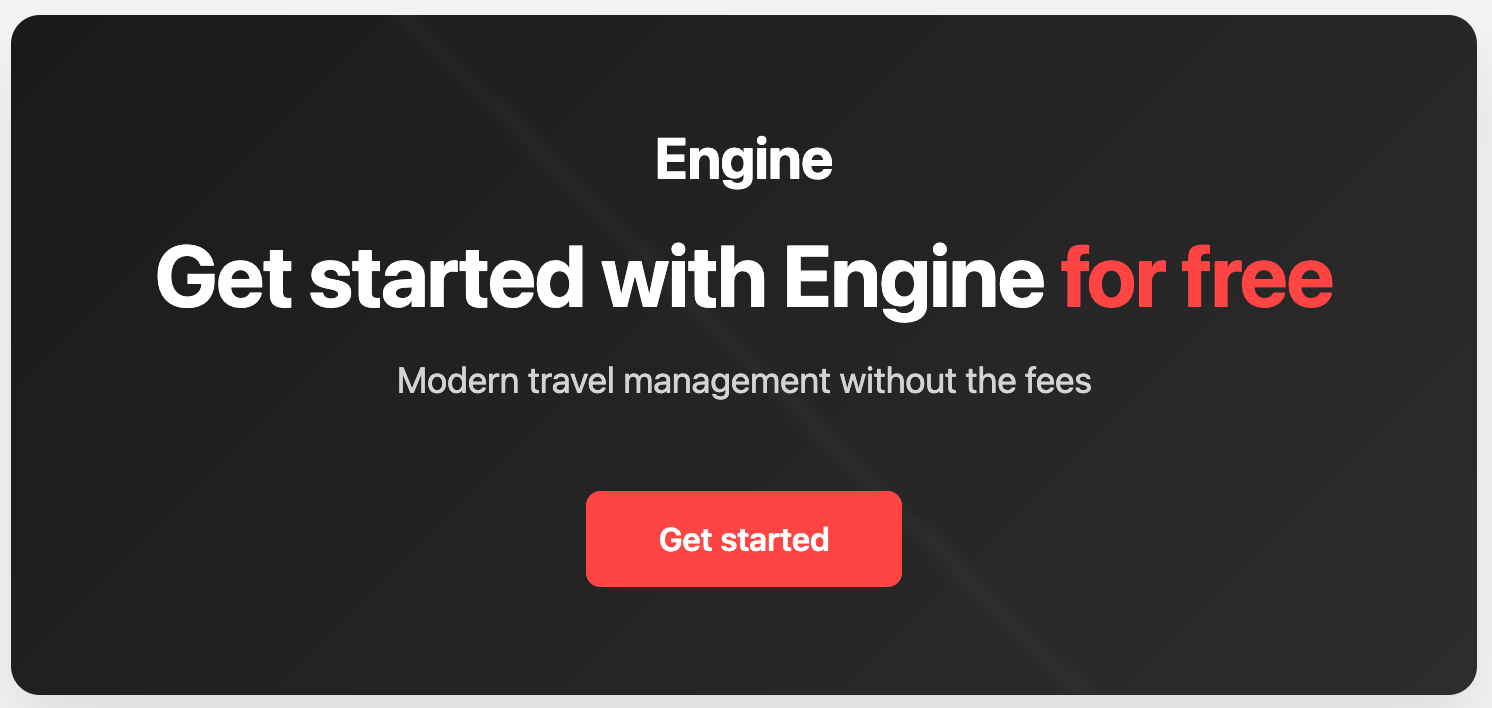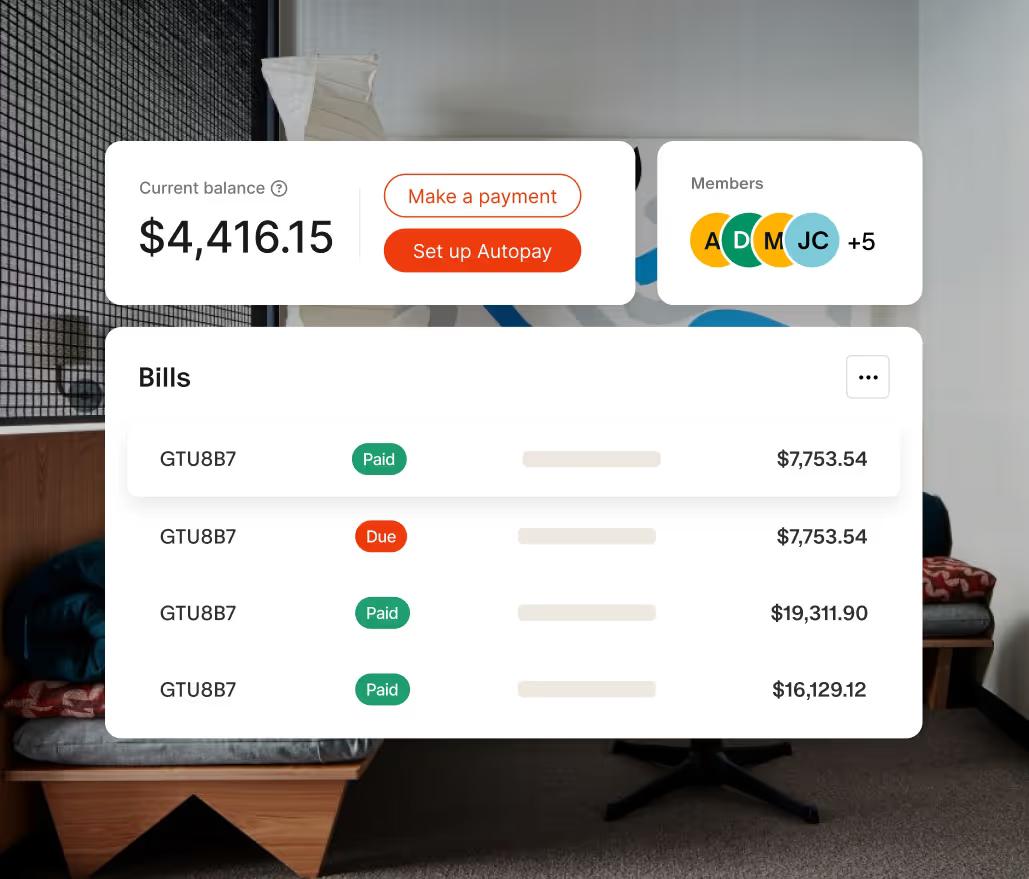Stop Chasing Receipts: How Direct Bill Eliminates Reimbursement Chaos

Your accounting deadline is tomorrow, and you're still hunting down hotel receipts from three contractors who checked out two weeks ago. One won't answer texts. Another lost the slip. The third swears he sent it, but you can't find it.
Meanwhile, your project profitability report is unfinished because you can't close the books without matching scattered hotel charges across four active job sites.
Direct Bill addresses this by eliminating the reimbursement process entirely. Your company pays hotels directly through one consolidated monthly invoice. Zero employee reimbursements. No personal credit cards. All charges flow to one statement with project tags already attached.
Direct Bill Changes Who Pays and When
Direct Bill changes how payment happens. Hotels bill Engine directly, so your crew never has to pay out of pocket and wait weeks for their money. You just get one consolidated monthly invoice from Engine at the end of the month for all your team’s bookings.
That means you eliminate the finance-operations tension that reimbursements create. Finance gets automated controls and bookings move fast. Operations gets instant booking without bypassing compliance.
The system builds project-code tagging into the booking flow. Job code, cost center, and PO number lock onto the reservation when you book. At checkout, your booking appears on the single monthly invoice with the project tag still attached.
What your teams gain:
- Finance gets one monthly invoice instead of chasing receipts.
- Operations books and checks in without card hassles or paperwork.
- Project Managers see costs in real time while crews are still on-site.
What disappears:
- Receipt collection
- Personal credit cards funding company travel
- Manual allocation of expenses
- Reconciliation nightmares at month-end
- Cash flow strain on field workers
- The approval bottleneck where Finance needs controls but Operations needs speed
See How the Operational Flow Changes from Booking Through Payment
With Direct Bill, the workflow changes at every step. No more personal cards. No more reimbursement requests. No more manual allocation. The job code follows from booking to final billing.
- Booking: Engine lets you build project-code tagging into the booking flow. Job code, cost center, and PO number lock onto the reservation. You avoid extra steps and missed charges because tagging happens when the room is booked—using your custom job codes.
- Check-in: With incidental coverage enabled, hotels bill Engine directly for the entire stay. No credit card forms. Crews walk in with just their ID.
- Checkout: Your booking shows up on the single monthly invoice with the project tag still attached.
- Month-end: Export clean data with custom fields pre-tagged for your accounting system. No more manual allocation
Engine Handles Payment and Incidentals Without Personal Cards
Direct Bill systems vary in capability. Generic platforms might consolidate invoicing, but they don't include the custom fields and automated controls that project-based companies need for accurate job costing. When you enable incidental coverage, Engine covers those extra hotel expenses that usually hit personal cards—so every line item for crew travel is effortless.
Engine built Direct Bill specifically for construction, manufacturing, and logistics teams managing crew-based work. The system enforces policy at booking, not after money is spent, so project expenses are easier to control.
Set Up Direct Bill: Finance and Ops Working Together
The workflow is straightforward once it's running. Getting there requires both teams to align before the first booking happens. Set this up wrong, and you'll recreate the same chaos in a new platform. These steps build alignment before the first booking happens.
Both departments must agree on custom field structure up front. This one decision eliminates future reconciliation headaches. When Finance and Operations agree on the job costing rules, the system enforces what both teams need.
Finance Defines Cost Allocation Rules
Finance determines which custom fields the accounting system needs—job codes, cost centers, PO numbers. They decide which fields are required at booking and set travel policies with per-diem limits that enforce automatically.
The system makes over-budget bookings impossible. Policy enforcement happens when the room is booked, not weeks later during reconciliation.
Operations Builds the Booking Workflow
Operations sets up who can book for whom and configures approval workflows for bookings over certain limits. Training crew coordinators takes minutes because job codes are dropdown menus, not free-text boxes where typos cause problems.
The booking process needs to work for people in the field, not just office staff. If it's complicated, crews will find workarounds that defeat the whole system.
Lock Down Month-End Processes Early
Set automated reports to export on your accounting close schedule. Establish who reviews the consolidated invoice—should take minutes, not hours. Test the entire workflow with sample data before real bookings go live.
Month-end chaos happens when you skip this step and discover problems after crews have been booking for weeks.
Start Small, Then Scale
Launch with one project team. Test the process, validate the workflows, and get feedback from Finance and field crews. Roll out company-wide only after proving it works without creating new problems.
Incidental Coverage Fixes Cash Flow Problems That Cost You Good Workers
The traditional reimbursement system creates a cash flow structure that saves your company money by delaying payment. Contractors pay, wait for approval, then wait for payment. But this hurts morale and costs you good workers.
Engine’s optional incidental coverage changes the cash flow structure. With Direct Bill and incidental coverage enabled, Engine handles both room charges and those extra expenses (parking, resort fees, room service) that typically hit personal cards. Payment becomes controlled and predictable, and crews are never left waiting for payment.
High-value field workers stay with companies that don't burden them with funding work travel. When managers say "we're losing good people," expense reimbursement is often the hidden reason.
Take Control of Travel Costs Before Money Leaves
Traditional reimbursement policies force Finance to react, chasing receipts, finding overspending after money is gone, and allocating costs manually weeks later. Every month-end is a fire drill.
Direct Bill makes expense management proactive. Engine builds controls into the booking process. You enforce policy at the source. Compliance happens when the booking is made. You prevent the problem instead of documenting it later.
Ready to stop chasing receipts and start controlling costs before the money leaves? Engine's Direct Bill gives you one monthly invoice, built-in project-code tagging, and zero employee reimbursements. Your Finance and Operations teams can finally work from the same platform.

Frequently Asked Questions
Does Direct Bill cover flights and rental cars, or just hotels?
Yes, Direct Bill handles hotels, flights, and rental cars booked through Engine. All three show up on your consolidated monthly invoice with your pre-set custom project tags already on them, so you can cut out reimbursements for all your travel.
What happens if someone books a room with the wrong project code?
You can update project codes before checkout in most cases. Contact Engine support to fix the tag before the invoice processes. Train crew coordinators to double-check tags when booking to catch errors early.
Can we start with Direct Bill for some projects and keep using reimbursements for others?
Yes. Run both systems simultaneously during your transition period. Most companies start Direct Bill with one project team to validate workflows and gather feedback from Finance and field workers, then expand company-wide once everyone confirms it works smoothly.





.jpg)















.jpg)
![How to Get the Best Hotel Deals and Rewards [Infographic]](https://cdn.prod.website-files.com/66a41388b1be9ba182f1e80c/66a41388b1be9ba182f1f257_Windsor_Hotel_-_in_winter.avif)







.avif)

